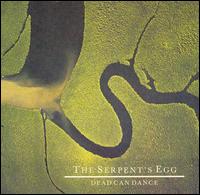Dead Can Dance
 Today it's my first free day in two weeks, and I decided to sleep more than usual. Even though I woke up at 8.30am, as usual, I forced myself to keep sleeping and managed to do it until 12.30pm! More than 11 hours of sleep it's something I can't afford very often, and it feels good! But I have to admit that after sleeping for so long, I feel kind of slow... and in those occasions I need to listen to the right kind of music. My choice, this morning, was "The Serpent's Egg", by Dead Can Dance.
Today it's my first free day in two weeks, and I decided to sleep more than usual. Even though I woke up at 8.30am, as usual, I forced myself to keep sleeping and managed to do it until 12.30pm! More than 11 hours of sleep it's something I can't afford very often, and it feels good! But I have to admit that after sleeping for so long, I feel kind of slow... and in those occasions I need to listen to the right kind of music. My choice, this morning, was "The Serpent's Egg", by Dead Can Dance.Dead Can Dance combine elements of European folk music — particularly music from the Middle Ages and the Renaissance — with ambient pop and worldbeat flourishes. Their songs are of lost beauty, regret and sorrow, inspiration and nobility, and of the everlasting human goal of attaining a meaningful existence. Over the course of their career, Dead Can Dance has featured a multitude of members, but two musicians have remained at the core of the band — guitarist Brendan Perry and vocalist Lisa Gerrard. Perry had previously been the lead vocalist and bassist for the Australian-based punk band the Scavengers, a group who were never able to land a recording contract. In 1979, the band changed their name to the Marching Girls, but they still weren't able to sign a contract. The following year, Perry left the group and began experimenting with electronic music, particularly tape loops and rhythms. In 1981, Perry formed Dead Can Dance with Lisa Gerrard, Paul Erikson, and Simon Monroe. By 1982, Perry and Gerrard decided to relocate to London; Erikson and Monroe decided to stay in Australia. Within a year, Dead Can Dance had signed a record deal with 4AD. In the spring of 1984, they released their eponymous debut album, comprised of songs the pair had written in the previous four years. By the end of the year, the group had contributed two tracks to "It'll End in Tears", the first album by This Mortal Coil, and had released an EP called "Garden of the Arcane Delights". In 1985, Dead Can Dance released their second album, "Spleen and Ideal". The album helped build their European cult following, peaking at number two on the U.K. indie charts. For the next two years, Dead Can Dance were relatively quiet, releasing only two new songs in 1986, both which appeared on the 4AD compilation "Lonely Is an Eyesore". "Within the Realm of a Dying Sun", the group's third album, appeared in 1986. In 1988, the band released their fourth album, "The Serpent's Egg".
"The Serpent's Egg" is heralded by an astounding first track, "The Host of Seraphim." Its use in films is no surprise in the slightest — one can imagine the potential range of epic images the song could call up — but on its own it's so jaw-droppingly good that almost the only reaction is sheer awe. Beginning with a soft organ drone and buried, echoed percussion, Gerrard then takes flight with a seemingly wordless invocation of power and worship — her vocal control and multi-octave range, especially towards the end, has to be heard to be believed! Nothing else achieves such heights, but everything gets pretty darn close, a deserved testament to the band's conceptual reach and abilities. Slow plainsong chants such as "Orbis De Ignis" mix with the harpischord and overlaid vocals of "The Writing on My Father's Hand" and the slow build and sweep of "In the Kingdom of the Blind the One-Eyed Are Kings." Two of Perry's finest vocal moments occur here. The first, "Severance," is a slow, organ/keyboard led number that showcases his rich, warm vocals exquisitely — it's no wonder that Bauhaus chose to cover it on its reunion tour. "Ullyses," the album's closing track, makes for a fine ending as much as "The Host of Seraphim" did an opening, Perry's delivery almost like a reading from a holy book, the arrangement of strings and percussion rhythmic, addictive and lovely.
"The Serpent's Egg", together with "Spleen and Ideal", "Aion" and "Into the Labyrinth", is one of Dead Can Dance best albums. And definitely a good companion for a slow Sunday!

0 Comments:
Post a Comment
<< Home